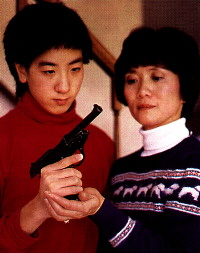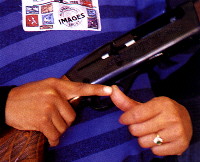
Brought to you by Florida Firearms & Training & www.aaof.us

This is the primary rule of gun safety. A "safe direction" means that the gun is pointed so that even if it were to go off it would not cause injury or damage. The key to this rule is to control where the muzzle or front end of the barrel is pointed at all times. Common sense dictates the safest direction, depending on different circumstances.

When holding a gun, people have a natural tendency to place their finger on the trigger. Don't do it! Rest your finger on the trigger guard or along the side of the gun. Until you are actually ready to fire, do not touch the trigger.

Whenever you pick up a gun, immediately open the action and look into the chamber(s) which should be clear of ammunition. (If the gun has a magazine, remove it before opening the action and make sure it is empty.) If you do not know how to open the action or inspect the chamber(s), leave the gun alone and get help from someone who does.
Regular cleaning is important in order for your gun to operate correctly and safely. Taking proper care of it will also maintain its value and extend its life. Your gun should be cleaned every time that it is used.
A gun brought out of prolonged storage should also be cleaned before shooting. Accumulated moisture and dirt, or solidified grease and oil, can prevent the gun from operating properly.
Before cleaning your gun, make absolutely sure that it is unloaded. The gun's action should be open during the cleaning process. Also be sure that no ammunition is present.
NRA Basic Firearm Training Program -- Safety with firearms begins with learning the rules outlined in this brochure and acquiring the skills to apply them in a responsible and conscientious manner. You can obtain hands-on training in the safe and proper use of different types of firearms by enrolling in a course of the NRA Basic Firearm Training Program.
Many thousands of persons attend these courses annually and receive a solid foundation in the basics of safe firearm handling and shooting skills. NRA basic courses are conducted in communities throughout the United States by NRA Certified Instructors.
Courses are available in the following eight areas:
Become An NRA Certified Instructor -- This program prepares experienced shooters to teach firearm safety and shooting skills to others as NRA Certified Instructors. NRA Training Counselors in each state provide training to qualified candidates.
NRA Shooting Coach Program -- NRA Certified Shooting Coaches provide training to shooters and athletes who wish to develop and refine skills necessary for success in competitive shooting.
NRA offers a wide variety of programs, activities, and publications, including:
Youth Programs -- Youth activities in the shooting sports, such as: air gun programs for secondary schools; cooperative programs with 4-H, Jaycees, Boy Scouts, and The American Legion; marksmanship qualification programs; shooting camps and fairs.
Magazines and Newsletters -- Publication of InSights magazine for young shooters, Shooting Sports USA magazine for competitive shooters, and NRA Shooting Education Update newsletter for shooting instructors, training counselors, coaches, and youth leaders.
Books, Brochures, and Videos -- A variety of safety and educational materials, including: brochures such as A Guide to Firearm Safety, A Parent's Guide to Gun Safety, and Shooting for Safety; a Fundamentals of Gun Safety video; and the Eddie Eagle� Gun Safety Program (an accident-prevention program for children in the pre-kindergarten through sixth grade age group).
This brochure is not intended as a complete course in gun safety and is not a substitute for formal, qualified instruction in the handling, use, or storage of firearms.
 For
More Advanced Information & Care Click Here
For
More Advanced Information & Care Click Here 
Hunter's Code Of Ethices
Firearms Glossary
For more information about the NRA Basic Firearm Training Program please contact the NRA Training Department at 703-267-1430.
To join NRA today, or for additional
information regarding membership, call 1-800-NRA-3888.
Your membership dues can be charged to VISA, MasterCard,
American Express or Discover.